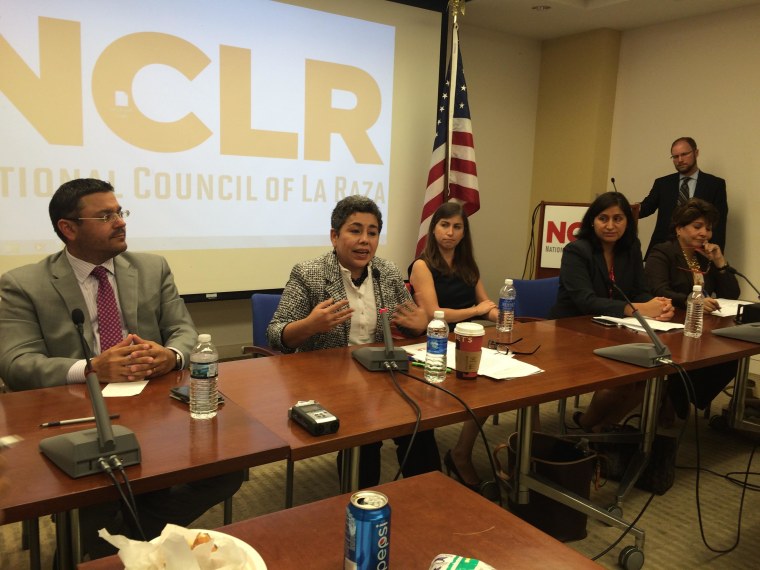WASHINGTON -- A national Latino voter registration campaign launched by two leading Hispanic groups is falling short of its goal, a possible indication of how Latino voting will fare in November’s elections.
The $5 million register-by-mail campaign announced in January by National Council of La Raza and Mi Familia Vota sought to register 250,000 in at least seven states. The campaign had registered about 80,000 as of Monday and another 10,000 more were expected, Janet Murgúia, NCLR president and CEO., said.
Even so, advocates spoke optimistically about the Latino electorate's potential for impact in next month's elections, but moderated their hope with some warnings of "headwinds" that could affect turnout.
Clarissa Martinez De Castro, an NCLR deputy vice president, said the voter registration goal of 250,000 was “extremely ambitious,” but that the more than 80,000 registered exceeds the mark for registrations in 2012, a presidential year.
The National Association of Latino Elected and Appointed Officials (NALEO) has projected a Latino turnout in November of 7.8 million, a 17.9 percent increase from the 6.6 million Latinos who voted in 2010, a number the group is sticking with. Martinez repeated that projection.
Arturo Vargas, NALEO executive director, said the number is very conservative and recognizes that much of the 2014 growth is driven by population growth, he said.
Since the 2010 midterms, another 4 million Latinos are eligible to vote. That means that there are 25.1 million, 17.9 percent, more Latinos eligible to vote this election, said in a phone interview Mark Hugo Lopez, director of Hispanic research at Pew Hispanic Center.
Because there are more Latinos eligible to vote, more Latino voters are likely to turn out this November. But the share that turn out could be about 32 percent, about the same as in 2010, Lopez said. In addition, there could be a larger number of Latinos not voting, he said. In 2012, a year of record turnout for Latinos, more Latinos eligible to vote stayed home than went to the polls.
“Keep in mind the strong headwinds this community is facing,” Martinez said.
She said beyond the president’s immigration decision, Latino voters are affected by voter ID laws, political campaigns who do not invest in voter registration, decreases in voter registration resources from non-partisan sectors and lack of outreach from both parties.
Matt Barreto, co-founder of the polling and research firm Latino Decisions and co-author of a newly-published book on the Latino vote, said there are a number of unknowns going into 2014, such as how the GOP will do with Latinos and whether Democrats will be able to mobilize the vote.
“I think we are entering an election where there haven’t been as many unknowns (about the Latino vote), especially as we contrast that to 2012,” Barreto said.
But there are places where Latinos are expected to have influence, such as in congressional districts where races may be decided by 2 to 4 percentage points. The number of Latino eligible voters is higher than those points in those states, he said. Latino voters could have impact in 14 GOP districts and 10 Democratic, he said.
In addition, Latinos could have influence in four of 7 competitive Senate races, including possibly Kansas, where an independent may unseat the Republican incumbent. Also, Latinos could have influence in nine gubernatorial races, he said.
“What are the campaigns doing? Are they reaching out and trying to get every Latino vote.”
Latino Decisions' Gary Segura, said Latinos potentially could have influence another way, by not voting.
It would be an act of influence for a Latino voter to decide not to vote for Democratic Sen. Kay Hagan of North Carolina when Obama delayed acting on immigration to help Hagan win, he said.
“You could argue that in any instance where a Latino-preferred candidate loses, and that Latino community turned out in smaller numbers because of that disillusionment, that Latino still did make a difference,” Segura said. “The decision not to vote is still a political decision.”
To which Murguía later said: "National Council of La Raza is not encouraging anyone to sit on the sidelines."
